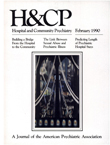HIV Infection in State Hospitals: Case Reports and Long-Term Management Strategies
Abstract
Issues facing state psychiatric hospitals as a result of the epidemic of human immunodeficiency virus (HIV) are illustrated by five cases. These issues include use of universal precautions to prevent transmission of HIV, medical diagnosis and management of HIV-infected patients, management of threatening behavior by infected patients, management of patients' sexual behavior, and discharge planning. The authors suggest that institutions will be required to ensure that sexual behavior between patients does not occur or to offer patients condoms or other means to protect themselves from infection. They recommend upgrading the medical capabilities of state hospitals so that they can competently provide long-term combined medical and psychiatric care to HIV-infected patients.
Access content
To read the fulltext, please use one of the options below to sign in or purchase access.- Personal login
- Institutional Login
- Sign in via OpenAthens
- Register for access
-
Please login/register if you wish to pair your device and check access availability.
Not a subscriber?
PsychiatryOnline subscription options offer access to the DSM-5 library, books, journals, CME, and patient resources. This all-in-one virtual library provides psychiatrists and mental health professionals with key resources for diagnosis, treatment, research, and professional development.
Need more help? PsychiatryOnline Customer Service may be reached by emailing [email protected] or by calling 800-368-5777 (in the U.S.) or 703-907-7322 (outside the U.S.).



